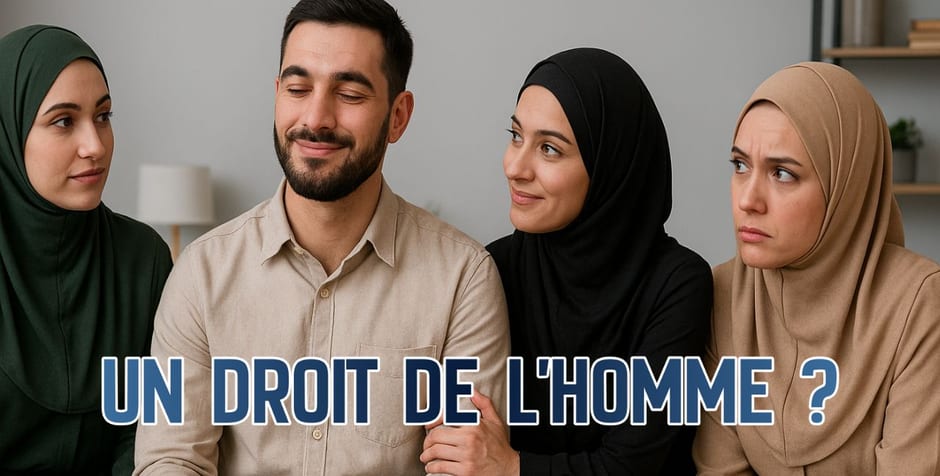
For the first time, the European Court of Human Rights will rule on polygamy. The case was brought before the court by A.A., a Yemeni polygamist lawyer who was granted asylum in the Netherlands after the Arab Spring. He initially brought his first wife and their eight children to the Netherlands under family reunification rules. He then decided not to request the arrival of his second and third wives, knowing that polygamy is prohibited in the Netherlands, but requested that the five children he had with them be allowed to join him. The Netherlands refused this new request because of the ban on polygamy, arguing that these children did not need to come to the Netherlands because they already enjoyed good living conditions in Turkey, where they were refugees with their two mothers.
However, in order to allow this family reunification, the Dutch authorities had suggested that the Yemeni man divorce his two wives, which he refused to do. For the first reunification, the authorities had already asked him to choose which of his wives he wanted to bring over, along with their children. Which he did.
This Yemeni refugee is now suing his host country before the European Court of Human Rights (ECHR) for violating his right to respect for his family life, due to the refusal to accept his five other children.
This is the first time that the European Court has agreed to rule on a polygamy case. We have to go back to 1992 to find a decision on this subject, taken by the former European Commission of Human Rights. This case is therefore very important, but also pernicious, because it does not directly attack the ban on polygamy, but undermines it by challenging the refusal to allow children to join their parents on the grounds of the ban on polygamy.
This case raises several major issues in the human rights system and the Court’s thinking.
Firstly, it shows the inability of the human rights protection system to prevent its own exploitation. Indeed, it seems clear that the Yemeni man’s intention is to bring his children over and then, in their name, bring over their mothers. If the mothers’ family reunification is requested by their minor children, and not by the husband, it cannot be refused on the grounds of polygamy. The ban would then be circumvented thanks to human rights. However, the judges are only dealing with the specific case of the children, and they cannot judge it on the basis of the applicant’s future intentions, especially since this legal strategy to circumvent the ban would be perfectly legal.
This case then reveals a second structural problem with the human rights protection system: its blindness to the indignity of the applicant’s attitude. Indeed, he was welcomed and given financial assistance by the Netherlands when he fled Yemen. The Netherlands provided him with material assistance and then allowed him to be joined by his wife and eight children, who benefited from the living conditions of Dutch society. Ungrateful, he is now attacking his “benefactor” to claim the “right,” of which he is allegedly unjustly deprived, to bring the other members of his family to immigrate. In doing so, he is also undermining one of the cultural foundations of the country: the prohibition of polygamy. The human rights system is incapable of seeing this glaring injustice because it cannot see beyond the end of its nose. It judges on a case-by-case basis. But what debt does the Netherlands owe to this man and his 16 wives and children? Is he not the one who is indebted to the people who rescued him? The ECHR is unable to see this higher justice, because human rights are based on the assumption that the individual is right and that society must justify itself. The human rights human being is “abstract”; he has no homeland.
This case finally reveals a third major problem: the European Court’s inability to justify – on the merits – the prohibition of polygamy. The Court has so deconstructed and expanded the concept of family, in the name of individual freedom, that it obviously extends to polygamous families and protects them. Thus, for the Court, states should recognize “unusual family relationships” and accept “the fact that there is not just one way or one choice when it comes to leading one’s family or private life". In its case law, the Court has denied any authority to “moral considerations or on social acceptability” or “traditions, general assumptions or prevailing social attitudes in a particular country” to justify a ban. As a result, it has become impossible, in current thinking, to justify the rejection of polygamy in the name of monogamy, that is, in the name of a moral and religious norm. Yet monogamy is the foundation of Greco-Roman and Christian civilization. It is a question of values, not of law. The rejection of traditions and morality blinds the Court, rendering it incapable of recognizing the civilizational value of monogamy and unable to conceive that the preservation of European identity and culture could justify restrictions on individual freedoms.
As for the argument of gender equality, the Court has already dismissed it in the name of freedom. When asked to rule on the ban on wearing the full veil in public, the Court, sitting in its most solemn formation, rejected this argument put forward by France. It then declared, memorably, that “a State Party cannot invoke gender equality in order to ban a practice that is defended by women – such as the applicant – in the context of the exercise of the rights enshrined in those provisions, unless it were to be understood that individuals could be protected on that basis from the exercise of their own fundamental rights and freedoms” (S.A.S. v. France). A few lines later, the Court goes on to declare that the wearing of the full veil “is an is the expression of a cultural identity which contributes to the pluralism that is inherent in democracy”.As we can see, liberal individualism sweeps everything before it. All that matters is individual autonomy.
In fact, the logic of liberal individualism based on the rights of the “abstract human being” has nothing to oppose polygamy; on the contrary, it leads to it.
The Court therefore finds itself completely powerless. Ready to allow itself to be manipulated, thereby facilitating the circumvention of the ban on polygamy. However, it knows how scandalized certain governments would be by explicit support for polygamy. It is therefore to be feared that, in its intellectual weakness, the Court will be reduced to bias, that is, to pretending not to rule on polygamy, but only on the situation of children. But in doing so, it would implicitly accept that polygamy is not a sufficient reason to refuse reunification.
Another approach would be to recognize that polygamy is sufficient grounds; or to remember that the European Convention guarantees “the right to marry and found a family” only between a man and a woman of marriageable age. It could then conclude that polygamous families do not enjoy the protection afforded to families under this Convention. If they were truly at risk, the children could apply for asylum, but not for family reunification.
The ECLJ has been authorized by the European Court to submit a brief in this case, which is available on our website (in French only).













